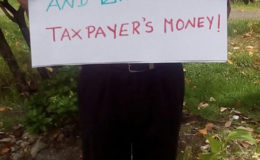Human rights activist Mark Benschop on Monday staged a one-man protest outside the Department of Public Service building where the Commission of Inquiry (CoI) into the fatal Camp Street Prison unrest came to a close.
Bearing a placard with the words `CoI a farce and a waste of taxpayer’s money,’ Benschop told reporters that the decision taken by the Commission last week to disallow his testimony, after he insisted that it be done publicly, was “an insult” and “trampled” on his rights.
“I merely wanted to talk about the system—how can we better the system? How can we reform the system? Not what the commission is doing basically—wasting taxpayers’ money, wasting people’s time, in order to fulfill their own agenda, that doesn’t serve the public’s interest,” he said.

Benschop stated that his intention was merely to speak on the conditions and treatment the prisoners were subjected to at the time and the fact that the prison officers are overburdened because of staff shortages. “So it’s not like I wanted to go there to bash any particular person or so,” he stated.
In his opinion, conflicts of interest have arisen from the appointment of Commissioners Merle Mendonca and Dale Erskine and retired Justice James Patterson, who is the Chairman.
“For the five years that I spent in prison there, most of us prisoners then—and I presume now—have had problems with the judicial system. How on earth can you have a former judge to preside at this Commission? Prisoners have had problems with the visiting committee—or the human rights group or something—who hardly ever visit the prison. In my five years I hardly saw them…The visiting committee, they do not look into the interests of prisoners as well. So, to have someone sitting there—Mendonca—as part of this Commission is also questionable, it’s almost a conflict of interest…Mr. Dale Erskine has worked there as Director of Prisons for several years. The acting Director of Prisons worked under Mr. Erskine,” he said.
Benschop, who said he handed in his statement to the Commission a week and a half ago, further stated that the decision for a hearing to be held in-camera should be left up to the discretion of the witness. “If I wanted to speak to the commission privately, I could have invited them… (somewhere)…this is a serious commission… All I wanted to do was to talk about my five years plus experience at the Camp Street prison, apparently, that is too much,” he lamented.
On Friday, Benschop was called to testify before the Commission, but was subsequently dismissed by the Chairman after he stated that he had no desire of presenting his testimony in-camera.
Statement
In Benschop’s statement, which he provided to the media, he covers several areas, including prison conditions, his relationship with the prison officers, his take on the visiting committee and prison reform.
The two-page statement gives a brief account of his five-year stint in the institution, where he recalled sleeping on a thin mattress “palled off by wood,” on the concrete floor and being placed on lockdown for over 23 hours a day for the first three years of his incarceration.
Three years after his complaints of being deprived of proper lighting and fresh air, he alleges that he was taken out about thrice per week and placed in a cage. This was only after the prison chaplain Rev. Faye Clarke, to whom he had complained, spoke to Erskine, then the Director of Prisons, on his behalf.
Benschop relates that he did not find the meals to be of adequate quantity or quality, although he did rely mostly on self-support from relatives. His relationship with the officers he described as “fairly good,” but recalled being placed in solitary confinement for 4 to 5 days after being involved in a verbal altercation with a warden. Also, he says he had had reason to lodge complaints with the Director of Prisons on several occasions, but no improvements resulted from the interaction.
The visiting committee he saw perhaps three times during his five years there, he noted. He also could not recall seeing any judges or magistrates visiting the prisons, as was required of the Board of Visiting Justices.
He recounts there being a prison riot in 2007, and that no officer came to his division, but that he and another inmate were pulled to the upper level by prisoners who feared he would be harmed by teargas thrown near the division. He said he was ordered back to his cell by Erskine, but refused as he was “asked to negotiate on the prisoners’ behalf.”




